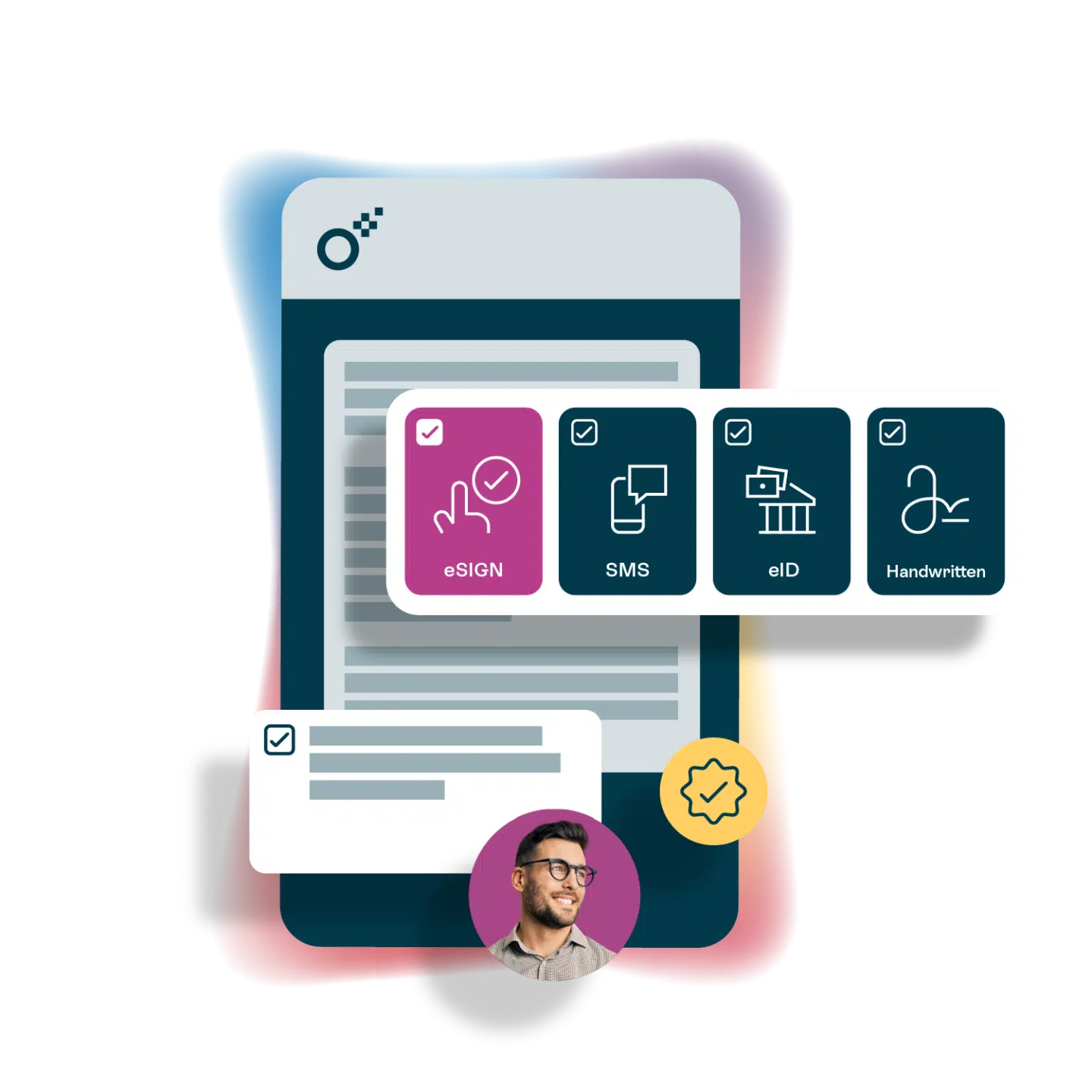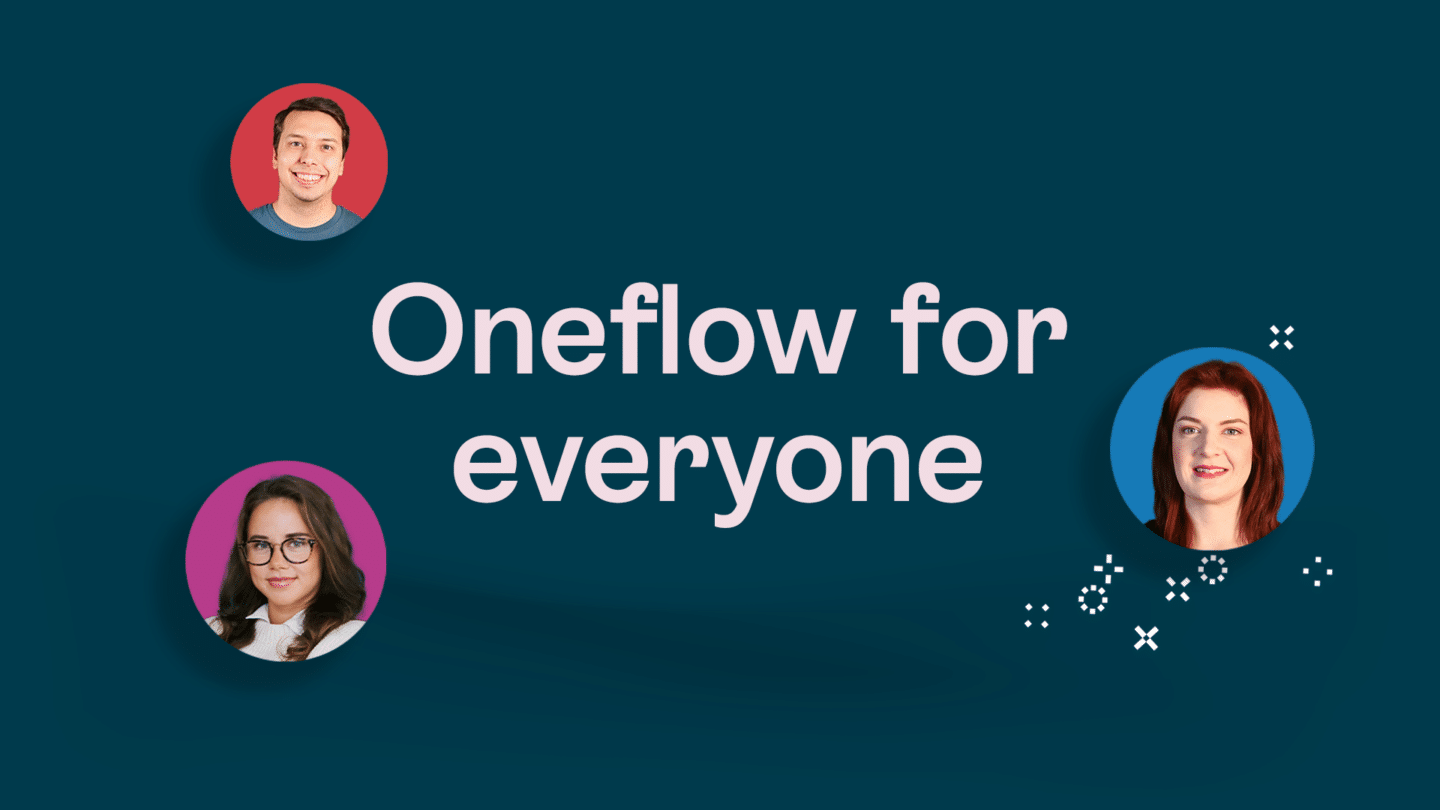Two are not stronger than one. At least when it comes to business systems. With Oneflow, you can use one single contract platform across all teams in your organisation. So that you can eliminate risks, be more efficient, and reduce costs.
One contract platform for all departments – from legal to sales and everything in between. That’s Oneflow. But what does that mean, exactly? We talked to four people in our teams to find out how Oneflow helps them work wonders.
Oneflow for Legal
As a Legal Counsel, Olivia Åman knows the pains of messy contract handling. A little too well, unfortunately. According to her, many things can go wrong when dealing with agreements. But Oneflow has been a real life-saver in her day-to-day work.
Pains of a traditional agreement process
The biggest pains of a traditional agreement process have one thing in common – lack of control. Olivia brings up four things she finds frustrating:
- Different versions of the same template
- Not knowing who has what version and how old it is
- Not finding the contract
- Forgetting to add a reminder to your calendar so you won’t miss any important events
Contracts are the most critical assets in a company. That’s why they must contain the correct terms and conditions, clauses, etc. But as soon as an employee downloads a contract template, you lose control.
When the Legal team updates the template, several older versions are spread all over, stored locally on people’s computers. And there’s no way for you to know who has what version.
“Lawyers put a lot of effort into creating good templates. But once a template is downloaded, it’s extremely hard to control that the contracts we send out contain the right terms and conditions,” says Olivia.
Then there’s the storage issue. Emailing agreements back and forth can often lead to them getting lost in transit because the manual step of uploading them to a contract management system means an extra layer of friction. Not to mention the risks of sending agreements through email.
“If you have a problem with the agreement and need to access it, you might not want to contact the counterparty to ask for the agreement. That’s a sign of weakness. And this is a big problem in many companies – the agreement gets signed but not stored. It stays in Outlook,” says Olivia.
How Oneflow helps Legal departments
Olivia describes starting using Oneflow as a massive weight lifted off her shoulders. Or a pile of contracts, if you will. First of all, she never has to worry about outdated templates. When making changes to a template in Oneflow, it guarantees that there’s only one version. And this gives her peace of mind.
Olivia is also a huge fan of the fact that all agreements automatically are stored after signing. They’ll never get lost, and she can access all agreements easily. She can just search for the contract across all workspaces with advanced filters.
“If I write a new clause that makes me think, ‘Didn’t I write this three years ago?’, I can always check because it’s so easy to search in Oneflow’s contract archive,” says Olivia.
Another feature Olivia speaks highly of is the calendar. It lets her keep track of upcoming renewals so she doesn’t miss anything.
“I don’t have to add contract events to my calendar because I have them automatically in Oneflow. And I get a notification when a contract is about to be renewed, for example,” says Olivia.
Read also: 5 benefits of contract automation that will boost your business

Oneflow and security
At Oneflow, we put security first. In everything we do. Since your contracts are the most sensitive and crucial assets to your business, we have a devoted Legal and Compliance team working with these issues.
Ask this before buying a contract automation platform
If you’re looking to buy a contract automation platform, make sure you challenge the vendor on all things security. After all, they will process your most valuable business assets. That’s not something you should take lightly.
We asked our Legal and Compliance team what you should evaluate before buying a contract automation platform. According to them, there are four main questions you should ask the vendor:
- What is their approach to GDPR?
- What is the use of third parties?
- How do they manage access control?
- How do they work with business continuity and incident management?
What are the top reasons our clients choose Oneflow?
Our Legal and Compliance team mentions three top reasons why companies choose Oneflow as their contract automation platform:
- Use of third parties
- GDPR compliance
- Legality
“Oneflow’s done a great job limiting how many third parties we currently use. Oneflow only uses five third parties, which is a lot smaller than most organisations. Especially organisations who are providing a similar service as we do,” says Olivia.
Then it’s the GDPR aspect. A significant part of our business includes keeping up to date with information security and current legislation.
“The good thing about Oneflow is that we are the data processor and not the controller. We’re assisting our customers when they get the data request from their customers, passing that on and working with them to meet their obligations from a data controller point of view,” says Olivia.
What about the legality of the actual contract itself? Olivia points out that many e-sign vendors fail to provide proof of the legal status of the contracts. Because their e-signature doesn’t come with an approved seal, causing massive problems should the company go bust, in case of a court case, or any challenge to the legal standing of the contract.
“There are many vendors out there who do e-signing in one way, shape, or form. But they don’t necessarily have a method that backs them up, which is the legal point of view. This is something that people should be aware of,” says Olivia.
Contracts signed with Oneflow, on the other hand, are automatically sealed with a Qualified Electronic Seal. This means you and your counterparties can be completely confident that what you signed today will remain verifiably unchanged, both now and in the future. Plus, you also have access to and can see every detail that’s happened within a contract – from start to finish.
“This is key in making sure that you can have control of who’s been in a contract and who’s accessed it. And that can stand up in court if needed,” says Olivia.
Oneflow for Sales
Admin work is not in a salesperson’s nature. Just ask any sales rep. Nicolas Paanalahti, Country Manager Finland, has used Oneflow as a sales rep and manager, so he’s seen the benefits in different team functions. And there’s no admin as far as you can see for any role.
Reasons why salespeople choose Oneflow
According to Nicolas, there are three main reasons why sales teams include Oneflow in their sales tech stack:
- To save time
- Decrease admin work
- Eliminate risks in the contract and proposal process
Even though we’ve progressed in so many areas, contracts still eat up a lot of the sales team’s time. Valuable hours that you could have spent on selling. Nicolas explains that many companies still manage their contracts manually, from creating to storing them somewhere after signing. Which is way too time-consuming in the sales process of today and tomorrow.
“Making the process quicker is very important to the companies I talk to. And obviously to save time for the salespeople to sell more,” says Nicolas.
As a sales leader, you want to make sure your proposals have the correct terms and prices. Surprises happen too easily. Oneflow can help reduce risks with access-controlled contract templates that are dynamic and secure. You can easily lock down sections you don’t want your sales reps to touch and only have the latest version available.
“Eliminating risks is one of the key reasons for choosing Oneflow. For example, if I’m a sales leader, how do I make sure my salespeople use the template I have decided on? How do I make sure they don’t make changes to those templates?” says Nicolas.
Another reason sales teams prefer Oneflow to any other contract platform is the archive. Nicolas often gets feedback from prospects saying it’s extremely valuable with a contract automation platform that tends to contract creation and signing, plus takes care of your contracts after they are signed. It gives control and structure.
“We go from the signature, broaden it, and put everything on one platform, natively integrated to your CRM,” says Nicolas.
Read also: 8 challenges sellers will face in 2023 and how to overcome them
How Oneflow helps in the sales process
How does Oneflow help a Oneflow sales rep in their sales process? Here’s Nicolas’ go-to strategy:
- “I always send a sales proposal. And the reason I do this is because it’s very easy for me to create it from Salesforce, our CRM. I can choose the correct template with a click, and all information automatically transfers to the proposal. And after that, I can send it to my prospect.”
- “What’s cool with Oneflow is that I can help the prospect and nudge them forward during all stages of the process. Basic analytics help me in my sales process, like seeing what they’re doing inside the proposal and how many times they’ve opened it. I can be sure I’m calling them at the right time. Oneflow takes the guesswork out of the sales process.”
- “When it’s time to negotiate, you can instantly make edits to the proposal – right after the call with the prospect. It gives that magic wow effect, allowing me to wow the clients before selling anything. It visualises how they can use Oneflow in their sales process.”
Oneflow for HR
Have you been involved in any recruitment lately? Then you might be aware of the struggles of attracting talent. Amanda Carapi Sjölin, Talent & Diversity Manager, knows what a strong employer brand can do for your chances of catching the candidate before the competition. Every touchpoint with your brand counts, even the last step of the recruitment process.
How Oneflow boosts employer branding
It’s not over until the candidate signs the offer (old HR proverb). With Oneflow, you can turn candidates into hires quickly and easily. How? By sending them interactive and truly digital employment contracts. The candidate can write their contact information, personal number, and address directly in the agreement. Saving them a lot of unnecessary emailing and snail mailing.
“The offer is the first impression the candidate gets of the company after the recruitment process. Oneflow helps boost employer branding in that regard,” says Amanda.
How your candidates perceive you is everything. So don’t leave anything to chance. Amanda describes the contract process with Oneflow as smooth, plus it’s easy to interact with your candidates. As questions about the offer are bound to come up, they can ask them directly in the comments section. And sign wherever they are. Maybe you’re lucky enough to get as positive feedback as Amanda?
“Recently, I talked with a candidate praising Oneflow, both the environmentally friendly aspect of the whole product and that it helps the individual in their everyday work,” says Amanda.
Read also: Top 10 HR tools for 2023


Ask us anything about truly digital contracts
Want to know more about digital contracts or the future of contract handling? We’d love to hear from you.






